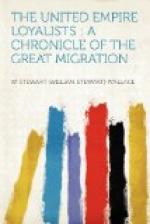Complaints were also made about the methods of the inquiry. The claimant was taken into a room alone with the commissioners, was asked to submit a written and sworn statement as to his losses and services, and was then cross-examined both with regard to his own losses and those of his fellow claimants. This cross-questioning was freely denounced as an ‘inquisition.’
Grave inconvenience was doubtless caused in many cases by the delay of the commissioners in making their awards. But on the other hand it should be remembered that the commissioners had before them a portentous task. They had to examine between four thousand and five thousand claims. In most of these the amount of detail to be gone through was considerable, and the danger of fraud was great. There was the difficulty also of determining just what losses should be compensated. The rule which was followed was that claims should be allowed only for losses of property through loyalty, for loss of offices held before the war, and for loss of actual professional income. No account was taken of lands bought or improved during the war, of uncultivated lands, of property mortgaged to its full value or with defective titles, of damage done by British troops, or of forage taken by them. Losses due to the fall in the value of the provincial paper money were thrown out, as were also expenses incurred while in prison or while living in New York city. Even losses in trade and labour were discarded. It will be seen that to apply these rules to thousands of detailed claims, all of which had to be verified, was not the work of a few days, or even months.
It must be remembered, too, that during the years from 1783 to 1790 the British government was doing a great deal for the Loyalists in other ways. Many of the better class received offices under the crown. Sir John Johnson was appointed superintendent of the Loyalists in Canada, and then superintendent of Indian Affairs; Colonel Edmund Fanning was made lieutenant-governor of Nova Scotia; Ward Chipman became solicitor-general of New Brunswick. The officers of the Loyalist regiments were put on half-pay; and there is evidence that many were allowed thus to rank as half-pay officers who had no real claim to the title. ‘Many,’ said the Rev. William Smart of Brockville, ’were placed on the list of officers, not because they had seen service, but as the most certain way of compensating them for losses sustained in the Rebellion’; and Haldimand himself complained that ’there is no end to it if every man that comes in is to be considered and paid as an officer.’ Then every Loyalist who wished to do so received a grant of land. The rule was that each field officer should receive 5,000 acres, each captain 3,000, each subaltern 2,000, and each non-commissioned officer




